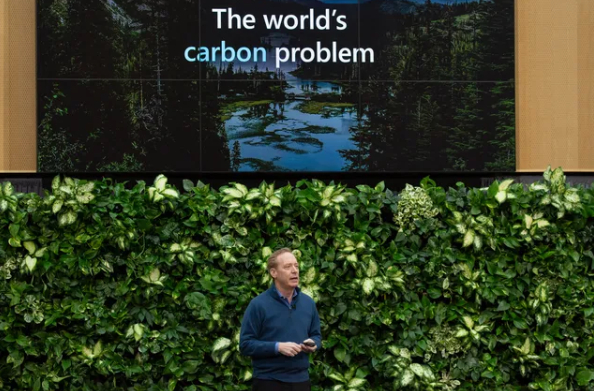November 27, 2025 | 04:49 GMT +7
November 27, 2025 | 04:49 GMT +7
Hotline: 0913.378.918
November 27, 2025 | 04:49 GMT +7
Hotline: 0913.378.918

Brad Smith, president of Microsoft, speaks during a climate initiative event at the Microsoft campus in Redmond, Washington, on Thursday, January 16th, 2020. Photo: Getty Images.
Microsoft is doubling down on a controversial plan to capture carbon dioxide emissions from wood-burning power plants. It announced a contract with energy company Stockholm Exergi to capture 3.33 million metric tons of carbon emissions from a biomass power plant in the Swedish capital in what is potentially the biggest deal of its kind to date - equivalent to taking more than 790,000 gas-powered cars off the road for a year.
It’s supposed to help Microsoft meet its goal of capturing more planet-heating carbon dioxide than it produces as a company by 2030 and then removing as much CO2 from the atmosphere as it has ever emitted since its founding by 2050.
But the jury is still out on whether wood-burning power plants actually help fight climate change or make things worse. Prominent environmental groups including the Center for Biological Diversity and Friends of the Earth International have criticized the strategy as a “false solution.” And back in 2018, nearly 800 scientists signed a letter to the European Parliament asking it to stop supporting the use of wood for bioenergy.
Exergi runs a power plant in Stockholm that runs on wood pellets and residue from forestry waste, also known as forest biomass. Since that fuel comes from trees that can theoretically regrow to capture as much carbon dioxide as the power plant releases by burning wood, proponents see it as a carbon-neutral source of energy. The European Commission actually considers biomass burning its largest source of renewable energy, even though it’s been tied to deforestation across Europe and the US.
Microsoft and Stockholm Exergi are taking that idea one step further by adding machinery to the power plant that’s supposed to capture a majority of its carbon dioxide emissions before it can escape into the atmosphere. By doing so, they believe they can achieve negative emissions - taking more CO2 out of the atmosphere than this source of energy produces. Negative emissions technologies like this have become popular with companies trying to offset the environmental impact of their carbon pollution.
But a growing body of research suggests the math doesn’t quite add up for bioenergy with carbon capture (BECCS). Devices that scrub CO2 out of smokestack emissions aren’t able to capture 100 percent of the carbon dioxide. And then there are additional emissions from clearing forests and transporting wood to be used as fuel. With that in mind, several studies have found that BECCS isn’t carbon negative after all and actually adds greenhouse gas pollution to the atmosphere.
Microsoft declined to respond to The Verge’s request for comment. It also didn’t clarify how much it would spend on the deal with Stockholm Exergi. But Microsoft has heard these concerns before. It signed another deal last year with Danish energy company Ørsted to capture 2.76 million metric tons of carbon dioxide from a wood-burning power plant in Denmark.
In Stockholm, construction of the carbon capture equipment at the power plant isn’t slated to start until next year — if Stockholm Exergi secures enough additional funding from other deals and government aid. Then, it would take 10 years to draw down all 3.33 million metric tons of carbon dioxide agreed to in the contract.
Stockholm Exergi sees this deal as a big stamp of approval for its carbon capture technology. “It is the strongest possible recognition of the significance, quality and sustainability of our project,” Stockholm Exergi CEO Anders Egelrud said in a press release.
(The Verge)

(VAN) A new study reveals how the simultaneous effects of ocean acidification, salinity and loss of oxygen are making the world more fragile.

(VAN) Hopes are growing that the creation of the first 3D turkey gut model could be a turning point in the battle against the virulent blackhead disease.

(VAN) Tyson, America’s biggest meat supplier, plans to shutter one of its largest beef processing plants as the industry continues to struggle with low cattle supplies and political pressure from Washington.

(VAN) New FAO study shows how digital solutions are empowering farmers and fishers to prevent losses and build resilient agrifood systems.

(VAN) Brazil's COP30 presidency pushed through a compromise climate deal on Saturday that would boost finance for poor nations coping with global warming but that omitted any mention of the fossil fuels driving it.

(VAN) Poultry farmers in the UK have been warned that they could face one of the worst winters yet for bird flu.

(VAN) Prices of main-crop paddy have risen sharply, with jasmine rice hitting 16,100 baht per tonne — the highest level in years.